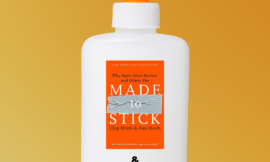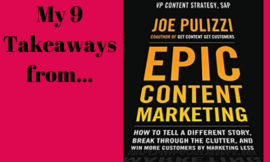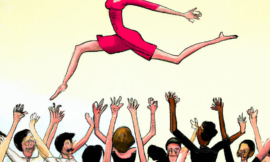“If you haven’t done the reading, why expect to be treated as a professional?” – Seth Godin
I read a ton. By a ton, I mean that I’m usually reading 6 or 7 books at a time. It doesn’t mean that I’m reading fast enough. I’m not. I would like to get through two books a month. But I’m not there. Yet.
You probably ask yourself the same question I ask myself – what books should I read?
I have a couple of lists for the fiction I’m reading. I pulled them off the internet because I’m bent on reading the classics. Somehow I feel that I’ll never be a real writer if I don’t read the classics. I don’t know if that’s true or not, but it will most likely become a self-fulfilling prophecy.
I’m a writer. A copywriter. A business woman.
I read books in those disciplines, because I’ve got to learn as much as I possibly can.
I don’t have a mentor. Not yet. And so I can only count on the authors of the books that I read to show me the way.
Here’s what I’ve learned in 2015.
Writing books
Writing the Breakout Novel by Donald Maas
I read this book because I plan on writing the breakout novel (what author doesn’t?). I found Maas’s book easy to ready, full of practical advice and excellent examples. I especially love the “Breakout Checklist” Maas provides at the end of each chapter. Each checklist provides a great review for the major points he discusses in the chapter.
If you’re writing a story – and it doesn’t matter what genre you’re writing – this book should be on your must-read list. But only if you have big plans for your book.
The Writing Life by Annie Dillard
The Writing Life is very different from Maas’ book. It’s not a guide. It’s not full of practical tips. It does pretty much what it says it will. It’ll tell you about the writing life. And Dillard tells you things that you don’t want to hear:
“Few sight are so absurd as that of an inchworm leading its dimwit life. Inchworms are the caterpillar larvae of several moths or butterflies. The cabbage looper, for example, is an inchworm. I often see an inchworm: it is a skinny bright green thing, pale and thin as a vein, an inch long, and apparently totally unfit for life in this world. It wears out its day in constant panic.”
But Dillard artfully draws on her experiences as a writer to give you an idea about the sensation and un-sensation of writing. Writing will “break your heart, your back, your brain, and then – and only then – it is handed to you.”
If writing is something you can’t do without in your life. Read Annie Dillard.
The Writing and Critique Group Survival Guide by Becky Levine
This book was recommended to me by Ilene Prusher a few years ago. It took me a while to get through because I insisted on reading it cover-to-cover as opposed to treating it as what it is – a reference book.
And though it wasn’t an easy read, I still recommend it for anyone starting a writing-critique group. There are really useful tips in here on what to look for and how to frame questions.
If you’re already part of a writing-critique group you may already know how important it is to be encouraging while helping steer your buddies in the right direction. This book will help you out with the insight (what to look for) and how to ask those questions.
Blogging for Writers by Robin Houghton
I picked this book up in a moment of weakness while at the the Barnes & Noble on 160 E 54th St. in midtown Manhattan.
The greatest part about this book was the exposure to so many different blogs by different writers. It gave me a better perspective of what successful author-bloggers are doing. There are also a lot of tips on building your site, producing excellent content and being effective on social media.
The part that kind of turned me off were those places the books tried to be everything for everyone – going into details about Blogger and WordPress. I’m sure this must be helpful to complete beginners. For some reason, I found it annoying.
Marketing books
Likeable Social Media by Dave Kerpen
I loved this book. It’s the first book I read on social media and it gave me some idea about how much I don’t know. Dave Kerpen is just so likeable. I really can’t think of another word that describes his tone and sound suggestions.
If you’re looking to build your business through social media, or even if you’re just considering it, read this book.Though check before you buy, I think there’s a new edition.
Persuasion: The Battle for Your Mind by Al Ries and Jack Trout
Apart from being an incredibly fun read, this book contains crucial marketing lessons that will help you position your brand better. “Cherchez le creneau” – look for the hole, find it and fill it is perhaps the most important positioning lesson of all. This book will tell you what you need to look for so that you can make your product or service fill the hole and succeed in the over-saturated consumerism world we’re living in.
Disruption: How Successful People Use Social Media for Business by Randy Milanovic, Gina Fiedel, Vincent Messina, David Kutcher, Jodi Kaplan and Christine DeGraff Editors: Iblis Bane and Jason Wiser
This is the second book on social media that I read and it filled in many lessons that I didn’t learn in Likeable Social Media. Social media is obvious to so many people. For some reason it’s not obvious to me and though I’ve now read two books on the subject, I still feel like I need the manual, though I feel much more comfortable. In that way Disruption saved my social media life. I now know that I don’t have to fear being myself. In fact, it’s probably an asset. “Be yourself” has pretty much become a cliche, but only because it’s so important to apply – in life in general, but especially on social media.
To Sell is Human by Daniel Pink
I finished this book a couple of weeks ago and I’m still taking notes. This books thoroughly researches the art of selling or moving others. It underlines how we all hate selling/sales/salesmen, but somehow we all love getting what we want. What we don’t understand is that the two are mutually exclusive – in other words, if you want to get what you want, you’re selling something. Pink does a fine job of mapping the way towards stretching our abilities and getting what we want. His book is full of interesting research, crucial insights, and he even provides you with the practical steps to apply what he teaches.
Business books
The Rules of Management by Richard Templar
I’m not a boss. I don’t manage anybody except myself (that’s a challenge in itself!). And yet I still felt that the lessons in this book applied to me, probably because the section on “managing yourself” is the biggest section. With rules like “respect individual differences” (rule 26), “know when to kick the door shut” (rule 54) and “keep learning especially from the opposition” (rule 76) you can’t go wrong. Sure there’s lots of stuff in here I already knew intuitively but it helped me to remember and reinforce. It’s definitely a book I’ll come back to.
Persuasive Presentations for Business by Robert Bly
I haven’t given a presentation recently. But I do understand the importance of being able to create and present effectively. That’s the reason I bought this book. Bly’s writing is so clear and easy to understand it actually made me feel like I could speak publicly and heaven forbid, even be good at it (I am in fact scared to death of public speaking, which is why I think it’s so important I do it). This is another book I yet to write down all my notes for.
Fiction
The World According to Garp by John Irving
I thought the story was decent but that the writing was just okay. Interestingly, Garp is a mediocre writer, kind of like John Irving (in this novel. I’m unfamiliar with his other novels and his writing might be better). What I found striking are the similarities between Caitlyn Jenner and Roberta Muldoon. Perhaps Irving is some type of crazy prophet-artist.
Zuleika Dobson by Max Beerbohm
I love the premise of this novel – the beautiful Zuleika Dobson falls in love with the snobby Duke of Dorset. Except that when she finds out that he is completely in love with her, she realizes that she cannot love him – she can’t love anyone who is affected by her beauty and charm. The writing is exquisite. But the story falters. I got sick of reading about how much Zuleika loves herself and is willing to put men in peril.
The Prime of Miss Jean Brodie by Muriel Spark
I loved the story. I loved the writing. I loved that Miss Jean Brodie is a rebel-teacher and I love the fact that she’s betrayed and never figures out by whom.
Nemesis by Philip Roth
This book was a complete waste of my time. I read Portnoy’s Complaint and loved it. I assumed that because it won the Man Booker prize and because it was written by Roth, that it was a winner. Big mistake. (And if you’re wondering why I continued reading – well, I believe we have something to learn from all books, even if they’re bad. As an aspiring writer, it’s the way I choose to learn how not to write.)
Tropic of Cancer by Henry Miller
Henry Miller is f*#$ing genius. Call him sick, perverted, whatever you want. But he’s one of the most brilliant writers I have ever read. And while I admit that this wasn’t a book for a nice Orthodox Jewish woman like me, as a professional writer, this book is a must. I found myself copying passages and passages in a desire to make his words mine.
Kids
The Westing Game by Ellen Raskin
This book was oddly enjoyable. It’s a mystery for kids, though it’s adults playing a game. I don’t know, there was something weird about it, I can’t quite put my finger on it, but it held my interest. The book has a lot of characters and Raskin artfully has you remember them and makes the story work. There’s a lot to learn here, if you’re a writer. Especially if you’re writing for kids.
Wonder by R.J. Palacio
My friend Tiffany Diamond Lebowitz, generously gave this to my daughter while we were visiting New York. She loved it (my daughter that is, actually Tiff did too). My daughter then passed it on to me. An incredible read. No matter how old you are.
Ella Enchanted by Gail Carson Levine
I started out really loving this book. The writing is beautiful. The premise is brilliant. But then at some point, it just turned into another version of Cinderella and I got bored and annoyed. But I made a note: things not to do with your protagonist.
Non-fiction
My Promised Land by Ari Shavit
I am so happy I read this book which was recommended to me by Fleur Hassan-Nahoum. This book is just so good. The writing is solid. The story is well-told. Scratch that, it’s set up and told brilliantly. There were parts that I found difficult to read (i.e. the massacre at Lydda), but maybe that’s a good thing. I love that Shavit has such compassion for both Arabs and Jews. I love that he loves Israel. I love his historical vision.
A Walk in the Woods by Bill Bryson
I would have never picked up this book. In fact I had never heard of Bill Bryson (I know) before my friend and colleague Simcha Lazarus practically forced me to read it. I loved it. Such a fun read. Two men in a forest and yet you want to keep reading. Bryson is a master storyteller. Here too, there’s so much to learn.
What books did you read in 2015? What’s on your reading list for 2016? I’d love to hear from you in the comments below.


